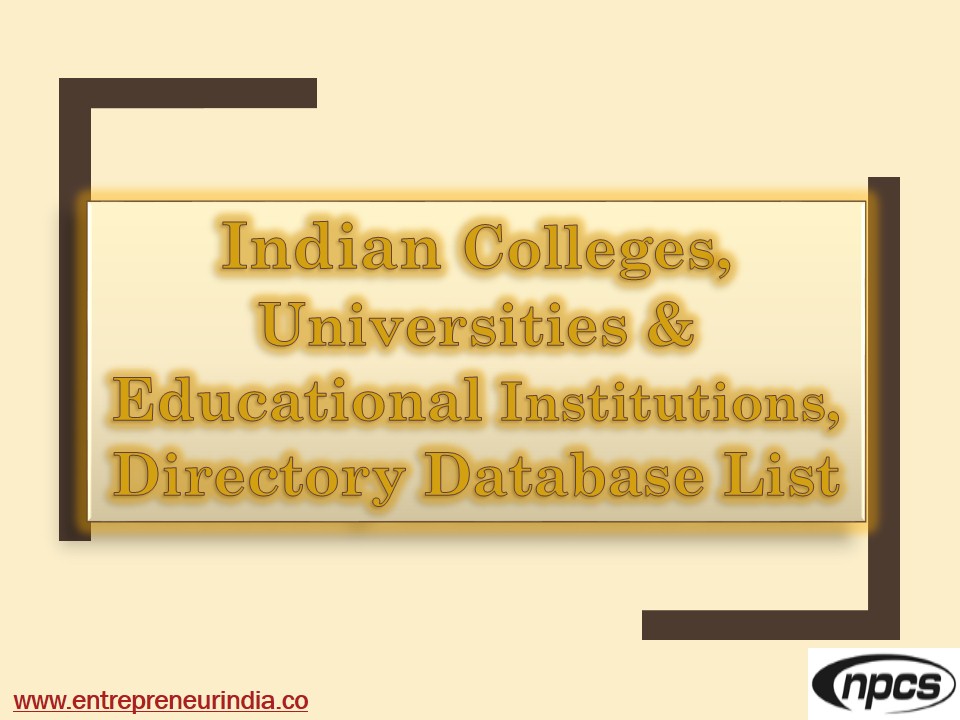
India’s vast education sector is both diverse and expansive, spanning from elite institutions to grassroots community colleges. With thousands of institutions offering varied disciplines, finding accurate and consolidated information becomes critical for students, educators, and policy makers. The indian colleges universities educational institutions directory database list serves this essential need by compiling a centralized, verified, and structured repository of academic institutions across the country. This comprehensive list not only aids in admissions and research but also supports institutional benchmarking, collaborations, and policy development. As India’s education ecosystem grows more competitive and globalized, having such a curated reference tool becomes indispensable.
Overview of Indian Colleges Universities Educational Institutions Directory Database List
The indian colleges universities educational institutions directory database list provides a consolidated source of information about the academic infrastructure across India. This resource offers in-depth profiles, contact information, accreditation status, and program details, making it a valuable asset for multiple stakeholders.
See Also : Aluminium Fabrication
Scope and Coverage of the Directory
The indian colleges universities educational institutions directory database list spans across multiple categories of institutions. It includes:
-
Central and state universities
-
Deemed universities
-
Private and autonomous colleges
-
Engineering, medical, law, management, and polytechnic institutes
-
Distance education and open universities
-
Technical and vocational education centers
Each entry offers structured data points such as founding year, university affiliation, approval bodies like AICTE or UGC, available courses, location, and website links. By covering rural and urban centers equally, the database reflects the true scope of India’s educational infrastructure.
Moreover, this directory serves as a transparent knowledge base for domestic and international researchers seeking insights into India’s academic landscape.
Benefits for Students and Parents
For students navigating the maze of higher education options, the indian colleges universities educational institutions directory database list proves invaluable. It allows prospective applicants to:
-
Compare institutions based on rankings, course offerings, and location
-
Verify accreditations and affiliations
-
Discover emerging institutions in specialized disciplines
-
Access up-to-date contact information for admission-related queries
Parents, too, find this resource useful for assessing institutions based on faculty strength, infrastructure, and student outcomes. This improves decision-making and ensures students are directed toward credible and recognized colleges and universities.
As a result, the directory serves as a trusted decision-making guide for academic planning.
Research and Institutional Collaboration
Academic researchers, education consultants, and think tanks also rely on the indian colleges universities educational institutions directory database list for macro and micro-level studies. It enables:
-
Trend analysis of institution growth across different states
-
Tracking regional disparities in educational access
-
Facilitating collaborative programs between domestic and foreign institutions
-
Identifying emerging centers of excellence in specific fields
Furthermore, policy makers use this database to study enrollment trends, faculty availability, and regional saturation of particular institutions. This insight plays a role in educational policy formulation and grants allocation.
Thus, the directory bridges knowledge gaps for data-driven decision-making.
Role in Education Marketing and Outreach
In the competitive higher education space, institutions benefit from being listed in the indian colleges universities educational institutions directory database list. It enhances their visibility among students, agents, and corporate recruiters.
Being part of this comprehensive list allows institutions to:
-
Attract applicants from different regions
-
Engage in national and global rankings
-
Promote new programs and academic initiatives
-
Build partnerships with research institutions and industry
This visibility also benefits coaching centers, ed-tech platforms, and education fairs looking to target the right institutions for engagement.
In contrast to fragmented online data, this verified list ensures institutions present accurate information in one credible location.
Digitization and Accessibility Features
The indian colleges universities educational institutions directory database list has evolved with the digital transformation of the education sector. Today, it is accessible through multiple formats:
-
Print directories for libraries, research offices, and institutional records
-
Digital databases available on subscription or license basis
-
Online searchable platforms with real-time updates
-
APIs for integration with ed-tech solutions and research tools
Such flexibility ensures that users can access the data based on their specific requirements. Enhanced features like filtering by region, stream, course level, and affiliation status make it user-friendly and highly navigable.
Moreover, regular updates ensure the directory remains current and accurate, increasing its trustworthiness.
Government and Regulatory Use Cases
Various government bodies utilize the indian colleges universities educational institutions directory database list to ensure regulatory compliance, monitor educational standards, and plan expansion. For example:
-
The University Grants Commission (UGC) uses it to identify and accredit institutions
-
AICTE leverages it for technical education governance
-
Ministry of Education uses it to assess state-level disparities in education access
By aligning this database with Aadhaar-based student registration and faculty databases, it contributes to a unified national education registry. This enhances transparency and ensures better monitoring and evaluation of institutional performance.
Such centralized data architecture supports India’s broader goals under the National Education Policy.
Utility for International Education Stakeholders
Foreign universities and education agents seeking collaboration opportunities in India often rely on the indian colleges universities educational institutions directory database list to identify reputable institutions. It supports:
-
Exchange programs and faculty mobility
-
Joint research initiatives and MoUs
-
Student recruitment for higher studies abroad
-
Academic benchmarking and curriculum exchange
Additionally, international ranking bodies and accreditation councils use this verified list to include Indian institutions in their evaluation metrics.
This global usability amplifies India’s educational diplomacy and contributes to the internationalization of its academic offerings.
Support for Career Counselors and Ed-Tech Startups
Career counselors, educational consultants, and guidance professionals frequently use the indian colleges universities educational institutions directory database list to advise students. It enables them to:
-
Create custom college recommendations
-
Identify niche programs for student goals
-
Provide verified information about seat intake, placements, and facilities
Similarly, ed-tech platforms that offer college discovery services, scholarship assistance, or career guidance rely on this database for back-end integration. APIs and machine-readable formats allow seamless automation of institution data into websites and mobile apps.
This cross-platform utility increases the relevance of the directory in modern education services.
Boosting Access to Emerging Institutions
A unique benefit of the indian colleges universities educational institutions directory database list is its ability to highlight emerging institutions that often lack digital visibility. This includes:
-
Private colleges in smaller districts
-
Recently established universities
-
Institutions offering specialized programs in arts, agriculture, or regional languages
By including such entities, the directory promotes inclusivity and allows students from underrepresented areas to find local, affordable education options.
This inclusiveness supports the national goal of equitable education access and regional academic development.
Future Enhancements and Data Expansion
Looking ahead, the indian colleges universities educational institutions directory database list is expected to incorporate more advanced features, including:
-
AI-driven recommendation systems for students
-
Real-time seat availability and admission status
-
Integration with placement records and alumni networks
-
Feedback mechanisms for student reviews and complaints
Such enhancements will further personalize the experience for users and strengthen trust in the data.
As the education sector continues to expand in response to population growth and skill demands, the need for robust, up-to-date data will only intensify. This directory will remain a cornerstone of informed decision-making.
See Also :hygiene product formulas
Conclusion
The indian colleges universities educational institutions directory database list stands as a vital resource in India’s educational ecosystem. By offering comprehensive, verified, and regularly updated data, it empowers students, educators, researchers, and policymakers alike. From admissions planning and regulatory oversight to institutional collaboration and education marketing, the applications of this directory are far-reaching. In an increasingly data-driven academic environment, access to such an organized repository ensures transparency, efficiency, and strategic growth. As India moves toward universal access to quality education, this directory will continue playing a pivotal role in connecting people to knowledge, institutions, and opportunities across the country.





